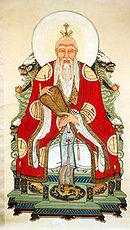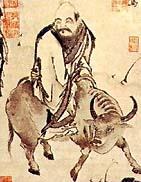Laozi
2009-08-04 17:02 BJT
Laozi (Chinese: 老子; pinyin: Lǎozǐ; Wade-Giles: Laosi; also Lao Tse, Lao Tu, Lao-Tzu, Laotze, Lao Zi, Laocius, and other variations) was a philosopher of ancient China and is a central figure in Taoism (also spelled "Daoism"). Laozi literally means "Old Master" and is generally considered an honorific. Laozi is revered as a god in religious forms of Taoism. Taishang Laojun is a title for Laozi in the Taoist religion, which refers to him as "One of the Three Pure Ones".
 |
| Laozi, depicted as a Taoist god. |
According to Chinese tradition, Laozi lived in the 6th century BC. Historians variously contend that Laozi is a synthesis of multiple historical figures, that he is a mythical figure, or that he actually lived in the 4th century BC, concurrent with the Hundred Schools of Thought and Warring States Period. A central figure in Chinese culture, both nobility and common people claim Laozi in their lineage. Zhuangzi, widely considered the intellectual and spiritual successor of Laozi, had a notable impact on Chinese literature, culture and spirituality. Throughout history, Laozi's work was embraced by various anti-authoritarian movements.
Laozi is an honorific title. Lao means "venerable" or "old". Zi, or tzu, means "master". Zi was used in ancient China like a social prefix, indicating "Master", or "Sir". In popular biographies, Laozi's given name was Er, his surname was Li (forming Li Er, 李耳) and his courtesy name was Boyang. Dan is a posthumous name given to Laozi, and he is sometimes referred to as Li Dan (李聃).
 |
| According to legends, Laozi leaves China on his water buffalo. |
During the Tang Dynasty, he was honoured as an ancestor of the dynasty after Daoists drew a connection between the dynasty's family name of Li and Laozi's bearing of the same name. He was granted the title Taishang xuanyuan huangdi, meaning "Supreme Mysterious and Primordial Emperor". Xuanyuan and Huangdi are also, respectively, the personal and proper names of the Yellow Emperor.
Laozi's magnum opus, the Daodejing, is one of the most significant treatises in Chinese cosmogony. As with most other ancient Chinese philosophers, Laozi often explains his ideas by way of paradox, analogy, appropriation of ancient sayings, repetition, symmetry, rhyme, and rhythm.
Laozi is traditionally regarded as the founder of Daoism, intimately connected with the Daodejing and "primordial" (or "original") Daoism.
Editor: Zheng Limin | Source: CCTV.com
 Mail
Mail Share
Share Print
Print


 Video
Video









 2009 China Central Television. All Rights Reserved
2009 China Central Television. All Rights Reserved